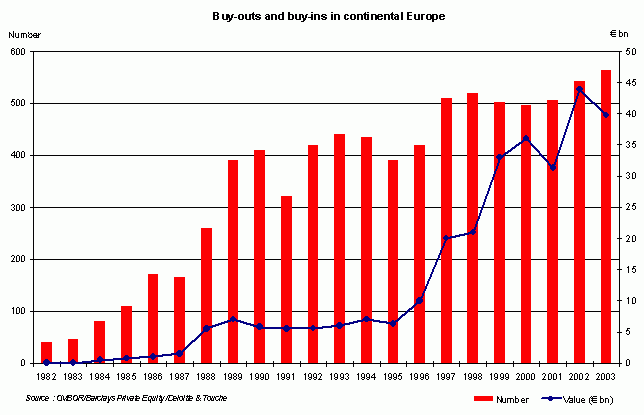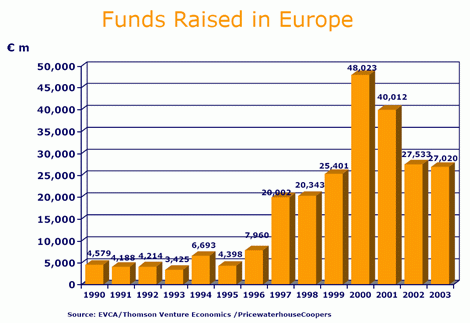Why so many LBOs?
Even as the M&A market plunges into one of the deepest crises in its history and as the venture capital market has been stopped cold in its tracks by the deflating of the Internet bubble, we are seeing more and more LBO transactions with several €1bn-plus deals, including TDF, Legrand and Aprovia in France; NCP and Unique Pub in the UK; Smurfit in Ireland; Demag/Stabilus in Germany; Seat PG in Italy etc.

This trend should conclusively dispel two false notions on LBOs:
- LBOs create value, since they use leverage and as debt interest is tax deductible;
- Private equity funds cannot pay more than trade buyers, who are able to count on industrial synergies.
In fact, the value truly created by LBOs is due neither
to tax nor accounting issues (i.e. debt leverage), but from operating benefits.
Many academic studies have shown that bought out companies do much better than
their sector peers. Heavy debt acts as a strong incentive for managers, who
are part owners of the company and have hopes of striking it truly rich. It
also means that they have to put their noses to the grindstones for three to
five years!
This is why LBO funds can pay as much as trade buyers who unlock synergies.
If the tax advantage of debt was what drove LBOs, the constant decline in this
advantage over the past 10 years, with lower tax rates and interest rates, would
have meant the end of LBOs. This has obviously not been the case and shows that
debt is actually of quite minor importance.
So why have LBOs taken off?
Significant funds raised recently
Private equity funds raised significant sums during the boom years of M&A, including about 45% for LBO deals, perhaps from investors who have forgotten about risk and are thinking only about return (often 20 to 25%, thanks to debt leverage). There are now large funds that are only partly invested. Fund managers are under heavy pressure to invest these sums rapidly, or to "empty" the funds (although that is illegal).

Growing sophistication by investors and in techniques
Special training of LBO-dedicated teams, attorneys,
banks and investors has made the LBO market more liquid and innovative, for
example in securitisation buy-out techniques. This is a virtuous circle.
Meanwhile, funds are taking on more and more staff and opening offices across
Europe. At the risk of sounding cynical, we believe that fund managers must
find a way to justify their often high compensation packages, the size of their
staffs, and even their European branch offices. So they make deals. This is
the beginning of a vicious circle.
This is a danger even though funds are completely autonomous and guarantee investors
only a long-term return and obviously not a precise pace of investment and divestment,
and even though they are given the freedom to make the right choices (the first
of which is to do nothing if the timing is not right).
Intense consolidation in some sectors
Many sectors are now so concentrated, and competition authorities so vigilant, that in some cases only financial investors can acquire whole companies. In some cases, trade buyers may enter the fray, but under such strict terms from competition authorities that they are unable to offer a competitive price, despite the potential synergies (which, in any case, are often harder to generate than expected).
Estate issues with family-controlled companies
Many European SMEs were established or expanded aggressively
under the prodding of their CEO/majority shareholder in the 1960s and 1970s.
Once they retire, manager/shareholders who wish to sell their company see LBO
funds as an alternative to selling out to a direct competitor who is often regarded
as the "devil incarnate", or to selling on the market, which has now
become almost impossible. They tend to feel even greater reluctance to sell
to a trade buyer when their company bears the family name, a name that the trade
buyer would be more likely to eliminate.
Moreover, the development of share ownership plans for employees, managers in
particular, ultimately makes a management-supported LSO more "normal".
Last but not least, managers' hope to strike it rich in the medium term is a
clear incentive for preferring an LBO to a trade buyer, which could endanger
their jobs.
Constant refocusing
Non-core subsidiaries of major groups have always been
favoured targets for buyout funds. The current crisis is causing them to sell
off subsidiaries (phone directory businesses, pipelines, etc.) to resolve financial
difficulties or to survive cash crunches.
Entire divisions may not be "ready" for other types of disposals,
as their activities may be too diverse to be sold off in one block to a trade
buyer or are too small to be floated.
The equities market has been closed off
Current weakness and volatility in equity markets make
a floatation much more complicated. In any case, a floatation is often only
a partial solution, as it is difficult to sell 100% of a company's shares.
P-to-P (Public to Private), meanwhile, has emerged as a way to use leverage
to buy out a listed company. P-to-P is attractive to some because of disappointing
showings of listed companies, in particular the small and medium-sized companies
that investors have snubbed.
Falling market valuations are a clear boost to LBOs, even though the level of
debt that is acceptable to the market has also fallen (instead of 6-7 times
EBITDA, it is now generally 4-5 times), purchasing power of financial investors
has often become comparable to that of trade buyers.
With equities markets closed off as a source of financing, and with recurrent
cash crunches and, in some sectors, the recession, taking their toll, trade
buyers no longer have the will or the means for external growth. When the barn's
on fire, you have better things to do than buy up the neighbour's land! This
has given buyout funds have a free hand.
The development of secondary LBOs
The LBO market renews itself through the development
of secondary LBOs (i.e. LBOs on LBOs), which consist of organising new debt
financing and a new round of equity financing for a company that has already
been through an LBO. This is tantamount to sucking capital back out of the company,
whose results since its first LBO had make it possible to rebalance its financial
structure.
In light of current market conditions, this is one of the most reassuring formulas
for participants, offering guaranties on the quality of the target's accounts
and the buyer's standards in terms of valuation, as all like-minded funds will
come to similar valuations. However, this is only a stopgap for funds, which
must "sell" both the sale and the purchase to their shareholders,
who are often the same from one fund to another... Moreover, the potential for
operating improvements is often limited after an LBO. So where is the value
creation?
Is the future so bright for all buyout funds? No, as some have done very poorly,
when considering the risk they have incurred. Some of them will be driven out
of the market, as they will be unable to raise new funds. Consolidation is likely,
even though the market is likely to continue growing in the coming years.